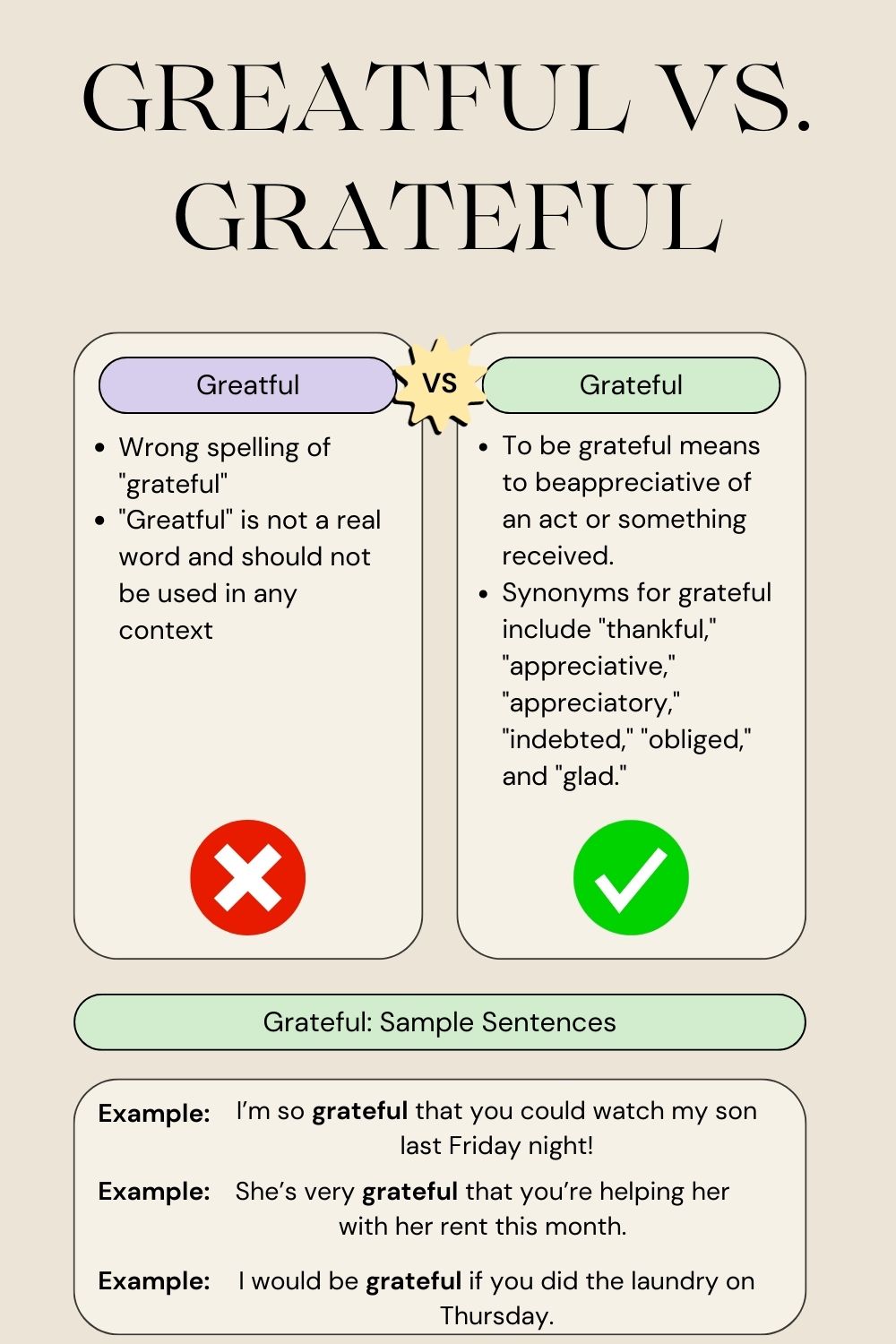There are many things which we should all be thankful for in our lives.
You may wish to say thank you for the scholarship, thank you for raising me, or thank you for the gift.
Thinking about the things that we are thankful for can make us feel happy, glad, lucky, and greatful! …or was it grateful?
It’s easy to mix up two words that sound the same, but let’s set the record straight once and for all!
Is it “greatful” or “grateful”?
The correct spelling of the word is “grateful”, meaning to be appreciative of an act or something received. It is similar to the word “gratitude”, which may be helpful in remembering the proper spelling. The common misspelling “greatful” is not a real word, so it should not be used in any context.
I’m “grateful” that spell-check detects the incorrect word “greatful”, because it is a very common mistake to make!
Jokes aside, if you’re using online software such as Google Docs or Microsoft Word, you should see a squiggly red underline any time you type the word “greatful”. That’s because “greatful” is not a real word!
What does grateful mean?
Grateful is an adjective, which is a word used to describe a noun.
It can be used right before a noun, as in “a grateful person” or as a subject complement like in “I am grateful for what you’ve done.”
We can express “grateful” in its comparative form by using “more grateful” and “most grateful” in its superlative form.
It means that someone is thankful or appreciative of something that someone else did for them, or something they received from another person.
“Thank you for the heads up!” means the same thing as “I’m grateful for the heads up!”.
Basically, if someone helped you out or gave you something, you should feel “grateful” toward them and say thank you! They will appreciate the sentiment.
They may be a bit less appreciative if you use the wrong spelling, however.
Especially in a business setting, you want to make sure that you get the spelling correct!
Spelling words correctly can make your writing more profound and professional, while random misspellings could make us look irresponsible and careless.
Is greatful a word?
“Greatful” is a common misspelling of the correct form “grateful”. “Greatful” is not a real word at all, and it does not exist in the English lexicon.
Most, if not all, native speakers know this fact like the back of their hand. So, even if people can understand what you really mean by “greatful,” using it in the real world is never advised.
The word “great” is an extremely common word in the English language, which is perhaps where the confusion comes in.
“Great” is an adjective that means something is very good. It is often used to describe a good emotion or feeling.
Unlike “grateful,” the rules change when we talk about the adjective “great.” We can intensify the meaning of “great” by using “greater” in its comparative form and “greatest” in the superlative.
Here are some example sentences for “great”:
It can also mean that something is big, mighty, or powerful
Examples:
Homophones: great and grate
You will still see the word “greatful” plastered all over message boards and online video comments, despite that spelling being incorrect.
That is because “grate” and “great” are homophones, which many people struggle with.
Homophones are two words that sound exactly the same, but are spelled differently.
To make things easier, homophones are those words that sound right to your ears but look wrong in your eyes. These words often come in pairs.
People often mix up the spellings of homophones because the words sound the same in our heads.
No matter how old we get, we can easily get tricked when we apply what we know about pronunciation in writing.
To be fair, using proper and correct English all the time is never easy. But, we cannot be too complacent either because it can make or break relationships, especially in business.
Messing word spellings up can have serious consequences inmedical and legal contexts, for instance. Therefore, people working in these fields need to be extra cautious.
Say, you want to use the word “heroin” but instead you spelled it as “heroine.”
Just imagine how that extra “e” could actually blow your diagnosis up if you’re a doctor.
In law, “deceased” and “desist” are also tricky homophones that could make anyone look like a bad drafter when interchanged.
Other homophones include:
- Weather and whether
- Plane and plain
- For and four
- Sell and cell
- Hear and here
As you can see, these are common words which are read and pronounced in the same way, but have entirely different meanings– spellings too.
When you have words that are spelled the same way but don’t necessarily sound or mean the same, you are also dealing with “homographs.”
“Fine” which means “okay,” and “fine” which means “penalty” are homographic in nature. We also have to be careful when using such kinds of words.
To avoid using the wrong version of a homophone, learning the etymology of words (where the parts of words came from) can help us differentiate between the words according to their spelling.
Let’s take a look at the key word of this article: grateful!
The etymology of grateful
The origin of the word “grateful” comes from the Latin word “gratus”, meaning “pleasing or agreeable”.
From gratus, the adjective “grate” was formed, which also meant “pleasing”. (Note: this usage of “grate” is outdated, and is no longer used in this way.)
During the mid-15th century, the suffix “-ful” was added on, giving us our current word “grateful” which is still commonly used today!
Related vocabulary of grateful:
- Grateful becomes a noun with the addition of “-ness”, giving us “gratefulness”.
- Using the superlative gives us “most grateful”, as in “extremely grateful”.
- As a comparative, we can say that someone is “more grateful” than others.
- Using the same prefix “grat-”, we get the word “gratitude”. This is a similar word which means thanks or thankfulness.
Speaking of thanks, here’s another common mistake people make when using the word “grateful”.
Grateful vs thankful – Differences
While “thankful” is often used as a synonym for “grateful”, the words are slightly different in meaning.
Gratefulness describes the feeling of appreciating something that someone else did for you.
This does not include things like luck, things you worked hard for, or things you did yourself.
You can also use it for potential situations which have not yet happened, such as “I would be grateful if you replied by Friday.”
Thankfulness can describe the feeling of everything listed above. You can be thankful toward yourself, other people, situations, luck, and anything else you can think of.
It’s a bit of a situation like “a square is a rectangle but a rectangle is not a square”.
To put it simply: you can only be grateful toward other people, but you can be thankful toward anything, including yourself.
Here are some examples of ways each can be used in a sentence.
Grateful in a sentence examples [actions]
Grateful in a sentence examples [gifts]
Thankful in a sentence examples
Here’s a check-in. When you buy a new camera and it works very well, are you “grateful for” the camera? Or are you “thankful for” the camera?
Answer: You are “thankful for” the camera, because you bought it for yourself. There is no-one to be grateful to, so the feeling is “thankfulness”.
Here’s another tricky bit of grammar that is associated with being grateful: “for” and “to”.
Grateful for vs grateful to
Another common question with the word “grateful” is whether to use “for” or “to” afterwards.
The answer depends on the subject of the speaker’s gratitude. Are you thankful to the person, or are you thankful for the action that they took?
You don’t need to be a master of grammar and syntax to remember the difference, just remember two short rules:
- You can be grateful “to” a person for doing something or giving something to you.
- You can be grateful “for” an act that someone did for you, or for their gift.
Here’s a check-in: If someone says you are beautiful, are you “grateful to” their comment, or “grateful for” their comment?
Answer: You are “grateful for” their comment, because they are giving you a compliment (like a gift)!
You can check out our full article on “grateful to” vs “grateful for” for more examples, as this is a tricky subject!
There are many other ways to use the word “grateful”, which means that there are also many incorrect ways of using it. Let’s look at some more!
Incorrect usages of “grateful” [Examples]
The word “grateful” should only be used when talking about someone’s help or item that was given to you.
However, many people incorrectly use it when they are talking about being thankful in general.
Here are some examples of some incorrect sentences containing “grateful”.
This is incorrect because the speaker was the one who found the good deal, not anyone else. They have no third party to be grateful towards.
Correction: “I’m so thankful that I found a good deal on this computer!”
Grateful cannot be used for benefits from luck or chance, because there is no third party to be grateful towards.
Correction: “I won the lottery!! I’m so lucky!”
When talking about the benefits of something you did yourself, you should not use grateful because you are not a third party. You cannot be grateful for yourself.
Correction: “I’m so glad I started saving when I was young. Now I can retire in peace.”
Now you know what not to do when using the word “grateful”! Still not satisfied?
There are many other ways to express your thanks and gratitude, so check out a few others before you go.
Synonyms for grateful
Synonyms are words that bear similar meanings. When we say “similar,” it means the meanings can either be the same or at least nearly the same.
They can differ in emphasis, collocation, and level of formality. They can also be appropriately or inappropriately used in certain contexts.
There are “strict” and “loose” synonyms in English. Strict synonyms are those we can use to directly replace a word in any given context without damaging style and diction, such as “glad” and “happy.”
Meanwhile, loose synonyms are those that are only applicable in certain contexts but are not interchangeable in all contexts, just like “find” and “discover.”
If you’re looking for other ways to say thanks, here are similar words to “grateful” which can also be used.
Grateful synonyms:
- Thankful
- Appreciative
- Appreciatory
- Indebted
- Obliged
- Glad
Here are some example sentences for all of these synonyms of grateful:
[table id=60 /]
No matter which word you go with, you can be sure that your meaning, “thank you”, will be clear to the listener.
Now go out there and show your gratefulness to the world, and thanks for sticking around! And if you would like to have a look at some more grammar pet peeves and interesting spellings of words, here are a couple of suggestions for you:
- Gray vs. Grey
- Et al.’s vs. et al.
- Amature vs. Amateur
- Mayhap vs. Mayhaps
- Wholistic vs. holistic
- Luckily for you vs. lucky for you

Hey fellow Linguaholics! It’s me, Marcel. I am the proud owner of linguaholic.com. Languages have always been my passion and I have studied Linguistics, Computational Linguistics and Sinology at the University of Zurich. It is my utmost pleasure to share with all of you guys what I know about languages and linguistics in general.


